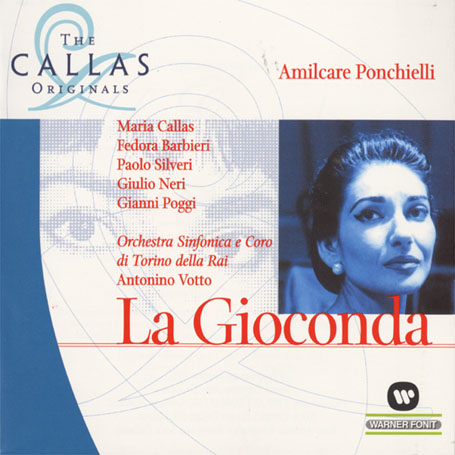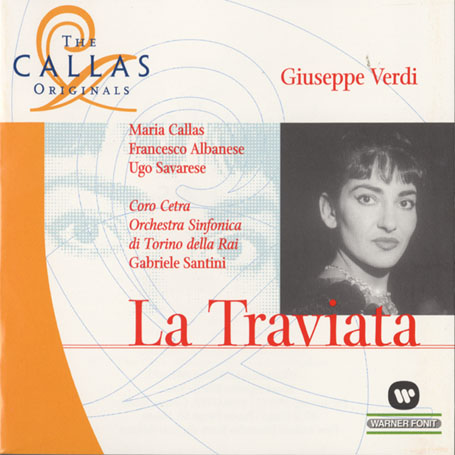Verdi La Traviata
Callas here in La Gioconda is a must-buy, and the rest is worth having at mid-price
View record and artist detailsRecord and Artist Details
Composer or Director: Amilcare Ponchielli
Genre:
Opera
Label: Warner Fonit Cetra
Magazine Review Date: 3/2000
Media Format: CD or Download
Media Runtime: 165
Mastering:
ADD
Catalogue Number: 3984-29355-2

Tracks:
| Composition | Artist Credit |
|---|---|
| (La) Gioconda |
Amilcare Ponchielli, Composer
Amilcare Ponchielli, Composer Antonino Votto, Conductor Armando Benzi, Isèpo, Tenor Fedora Barbieri, Laura Adorno, Mezzo soprano Gianni Poggi, Enzo Grimaldi, Tenor Giulio Neri, Alvise Badoero, Bass Maria Amadini, La Cieca, Contralto (Female alto) Maria Callas, La Gioconda, Soprano Paolo Silveri, Barnaba, Baritone Piero Poldi, Zuàne, Bass Turin RAI Chorus Turin RAI Orchestra |
Composer or Director: Giuseppe Verdi
Genre:
Opera
Label: Warner Fonit Cetra
Magazine Review Date: 3/2000
Media Format: CD or Download
Media Runtime: 122
Mastering:
ADD
Catalogue Number: 3984-29354-2

Tracks:
| Composition | Artist Credit |
|---|---|
| (La) traviata |
Giuseppe Verdi, Composer
Alberto Albertini, Baron, Baritone Ede Marietti Gandolfo, Flora, Mezzo soprano Enrico Caruso, Gastone, Tenor Francesco Albanese, Alfredo Germont, Tenor Gabriele Santini, Conductor Giuseppe Verdi, Composer Ines Marietti, Annina, Soprano Maria Callas, Violetta, Soprano Mario Zorgniotti, Marquis, Bass Tommaso Soley, Doctor, Bass Turin RAI Chorus Turin RAI Orchestra Ugo Savarese, Giorgio Germont, Baritone |
Author: Alan Blyth
La Gioconda she recorded twice, here in 1952 and then, for EMI, in 1959. In this case the choice between versions is more finely balanced. What is beyond doubt is that you must hear Callas in this part if you want to understand why she was such a great interpreter. I just suggested that Violetta was her best role, but listening to her as Ponchielli's tragic heroine Gioconda must run Violetta pretty close, even though it wasn't as central to her career on stage; in the final, inspired act of Ponchielli's melodrama, all the tragedy of the wronged woman rising above her jealousy to allow her lover Enzo to escape with Laura, and then commit suicide, is expressed quite indelibly in words and music.
In her EMI recording she refined her interpretation; indeed she declared that anyone who wanted to understand what she was about should listen to the final act. If you take the role as a whole, here she is in stronger, in fact in overwhelming voice throughout, mixing love, fury, pathos, desperation in equal measure as she imprints on our minds the woman at the end of her tether so marvellously described in the score. Above all it is what she does in melding text and notes, and her complete emotional identification with the part that makes Callas's Gioconda the most emotion-laden in the work's history.
Barbieri is a fit antagonist in the famous Act 2 duet and on her own a magnificent Laura. As evil incarnate, Silveri is a powerful if unsubtle Barnaba. Neri, as the forceful Alvise, shows what Italian basses used to sound like, rich and firm in tone, imposing in manner: sad that he died so young. The drawback of the set is the ungainly, raw singing of Poggi, a fine voice ill-used by its owner. Apart from his penchant for cutting the score, Votto - as in the 1959 version - makes the most of the work's many strong points and overlooks its weak ones. The refurbished sound is admirable. Don't miss it.'
Discover the world's largest classical music catalogue with Presto Music.

Gramophone Digital Club
- Digital Edition
- Digital Archive
- Reviews Database
- Full website access
From £8.75 / month
Subscribe
Gramophone Full Club
- Print Edition
- Digital Edition
- Digital Archive
- Reviews Database
- Full website access
From £11.00 / month
Subscribe
If you are a library, university or other organisation that would be interested in an institutional subscription to Gramophone please click here for further information.




